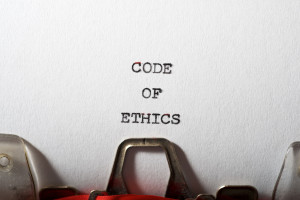UASD Code of Ethical Conduct: Why It Matters for Special Districts and the Communities They Serve
 At the heart of effective, accountable, and trustworthy public service lies a commitment to ethics. For the Utah Association of Special Districts (UASD), our Code of Ethical Conduct is more than a list of guiding principles — it is the foundation of our members’ character and credibility. In a world where public trust is hard-earned and easily lost, this Code affirms our commitment to acting with integrity, transparency, and respect in every facet of our work.
At the heart of effective, accountable, and trustworthy public service lies a commitment to ethics. For the Utah Association of Special Districts (UASD), our Code of Ethical Conduct is more than a list of guiding principles — it is the foundation of our members’ character and credibility. In a world where public trust is hard-earned and easily lost, this Code affirms our commitment to acting with integrity, transparency, and respect in every facet of our work.
A Shared Commitment to Integrity
Special districts in Utah provide essential public services — from water, sewer, and fire protection to cemetery, recreation, and mosquito abatement services. These are not glamorous functions, but they are critical to the safety, health, and quality of life in our communities. As stewards of public resources, members of the UASD — including board representatives and trustees — pledge to uphold the highest standards of personal and professional integrity.
That means being honest even when no one is watching, being truthful even when it’s inconvenient, and leading by example in all public activities. When we demonstrate integrity, we build public confidence. When we fail to, we jeopardize it — and in doing so, we compromise the very mission of our districts.
Responsibility to the Public and Each Other
The Code reminds us that we don’t serve ourselves — we serve the people of Utah. Accepting responsibility for our decisions and actions, and promoting respect for truth and fairness, reinforces the social contract between districts and the citizens they serve. Every interaction, whether it’s a board meeting, a public hearing, or a legislative session, is a chance to honor that responsibility.
We are also called to be sensitive to the rights and responsibilities of citizens. This means listening more than we speak, seeking understanding even when we disagree, and always prioritizing the public good over personal interests. It is this perspective — one of humility, stewardship, and duty — that sets ethical leadership apart from transactional governance.
Honesty Over Advancement
There may be times when personal recognition or advancement seems to tempt leaders into cutting corners or making compromises. But our Code is clear: honesty and integrity must never be sacrificed for honors, influence, or gain. These lines aren’t just ethical boundaries; they’re boundaries that protect the trust between districts and their communities.
Ethical conduct requires courage. It means speaking the truth when it’s uncomfortable, saying no when pressured to act otherwise, and holding each other accountable to a higher standard. It also means acknowledging mistakes, making them right, and learning from them — because integrity is not perfection, but persistence in doing what is right.
Respect for Authority and the Public
Discretion, civility, and respect are more than professional courtesies — they are ethical obligations. The Code emphasizes the importance of being respectful toward elected and appointed leaders, recognizing the roles we each play in our shared system of governance.
It also asks us to be attuned to the expectations and values of the people we serve. That sensitivity helps ensure we are not just legally compliant but ethically sound, responsive, and in touch with the needs of our communities.
Avoiding Conflicts of Interest
In public service, perception matters. Even the appearance of a conflict of interest can damage public trust. That’s why the UASD Code calls on members to avoid any interest or activity that could be — or seem to be — in conflict with their official duties. Transparency in this area isn’t just wise; it’s essential.
Public resources must be used for public purposes, and decision-making must remain free of undue influence. When in doubt, the ethical path is to disclose, recuse, and err on the side of public trust.
Legal Compliance and Lawful Advocacy
Districts operate within a complex framework of state and federal laws. Ethical conduct includes a commitment to full legal compliance in all operations. That means not only following the letter of the law but respecting its intent.
When it comes to advocacy and legislation, the Code is equally clear: only legal and ethical means may be used to influence legislation, and members must never issue false or misleading statements to lawmakers or the public. Misinformation — whether intentional or not — erodes public confidence and undermines the credibility of our advocacy.
Promoting Understanding and Fighting Misinformation
Another key pillar of the Code is the promotion of public understanding about special districts. Misconceptions and lack of awareness can hinder our work and reduce public engagement. By educating residents, we help ensure our services are better understood, supported, and utilized.
At the same time, we commit to refrain from spreading malicious or harmful information about others — including individuals, associations, organizations, and public entities. Civil discourse matters. Ethical communication means resisting the temptation to deflect criticism, attack others, or distort the truth for strategic advantage.
Living the Code Every Day
The UASD Code of Ethical Conduct is not a one-time pledge. It is a daily standard. It is lived in how we conduct meetings, how we make decisions, how we treat constituents and colleagues, and how we handle conflict. It serves as a mirror, reflecting the values that distinguish ethical governance from simply getting things done.
As special districts face increasing demands and growing scrutiny, this Code anchors us in what truly matters. It challenges us to lead with integrity, serve with humility, and represent our communities with honor.
By upholding these principles, we protect not only the reputation of our individual districts but also the strength and credibility of the special district system as a whole.






